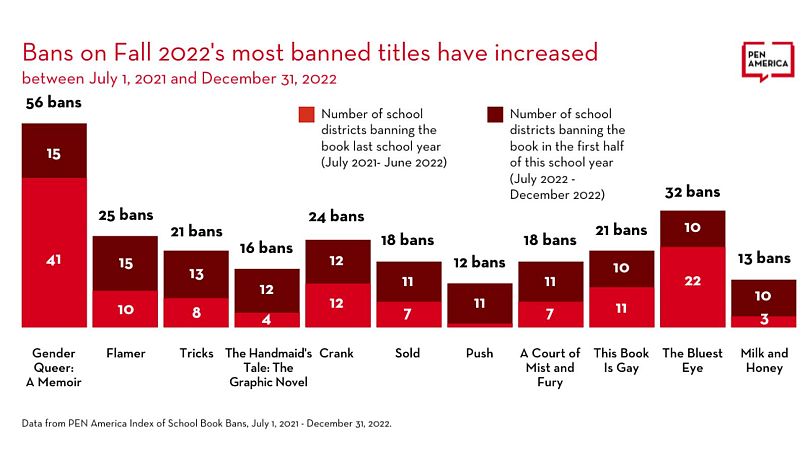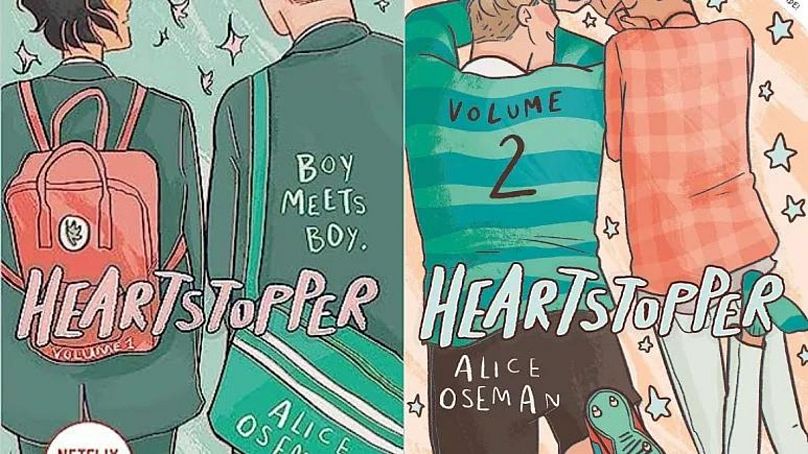Big names in the entertainment and art industries are raising the alarm on a sharp increase in book bans in the US, asking creatives to leverage their voices to stop the bans.
In an initiative started by Star Trek: The Next Generation star and Reading Rainbow host LeVar Burton, nearly 200 celebrities have signed a petition against book bans in the US.
 ADVERTISEMENT
ADVERTISEMENT
 ADVERTISEMENT
ADVERTISEMENT
Some of the star-studded signatories include Ariana Grande, Guillermo del Toro, Mark Ruffalo, Sharon Stone, Billy Porter, Aisha Tyler and Judy Blume. The open letter, which began collecting signatures this summer, is available in full at www.ArtistsAgainstBookBans.com.
"Far-right politicians like Ron DeSantis are championing draconian laws to ban books and the teaching of accurate multicultural American history in favor of upholding a homophobic, transphobic, and white supremacist vision of our nation," reads the website. "MoveOn has partnered with LeVar Burton to organize more than 150+ artists, entertainers, writers, and creators to sign an open letter condemning these bans as a form of censorship and a threat to all artists in every field, and calling for an end to this oppressive attack on artistic freedom."
According to PEN America, an organization that advocates for freedom of expression, the 2022-2023 school year saw 1,477 instances of book bans that have affected 874 unique titles.
Of the 874 unique banned book titles in the Index, 44% include themes or instances of violence & physical abuse; 38% cover topics on health and wellbeing for students (including content on mental health, bullying, suicide, substance abuse, as well as books that discuss sexual wellbeing and puberty); 30% include characters of colour or discuss race and racism; 26% present LGBTQ+ characters or themes.
Based on PEN America's findings, the most banned books in the first half of the 2022-2023 school year are titles like ‘Gender Queer: A Memoir’, by Maia Kobabe; ‘Flamer’, by Mike Curato; ‘Tricks’, by Ellen Hopkins; ‘The Handmaid’s Tale: The Graphic Novel’ by Margaret Atwood and Renee Nault; and ‘Crank (Crank Series)’, by Ellen Hopkins.
“We cannot stress enough how these censorious efforts will not end with book bans," stated Burton. "It’s only a matter of time before regressive, suppressive ideologues will shift their focus towards other forms of art, expression, and entertainment, to further their attacks and efforts to scapegoat marginalized communities, particularly BIPOC and LGBTQ+ folks.”
The letter concludes that signatories will “refuse to remain silent as one creative field is subjected to oppressive bans” and urges artists to “band together, because a threat to one form of art is a threat to us all.”
“It’s embarrassing that we are banning books in this country, in this culture, in this day and age. And it’s dangerous that a handful of individuals are deciding that any book with Black and queer people is divisive,” said Burton, executive producer of the 2023 documentary The Right to Read. “We are calling on everyone to join us in raising their voices to uphold artistic freedom, embrace multicultural history and put a stop once and for all to book bans.”
The majority of the book bans are being led by right-wing organizations or community efforts across the nation. One of the most influential right-wing groups is Moms for Liberty who, according to PEN America, has been responsible for nearly 60% of all advocacy-led book bans in the US over the past year.
The states with the biggest amount of book bans continue to be Texas, Florida, Missouri, Utah and South Carolina - all of whom have instituted punishments for educators who violent them.
Europe no stranger to book bans
Through the ebb and flow of governments over the ages, Europe has seen its fair share of book banning and even burnings, from the Spanish Inquisition to Nazi Germany.
Some of the most notorious book bans in recent history include 'Lolita' by Vladimir Nabokov, which was banned in France between 1956 and 1959 for being ‘obscene’; and 'Lord Horror' by David Britton, which was banned between 1991 and 1992 - the final book to be banned under UK law.
Although book censorship is largely under control in Europe, there have been efforts by some countries to bring it back.
Earlier this year, Hungary’s right-wing government fined a bookstore nearly €32,000 for for displaying the award-winning young adult graphic novel ‘Heartstopper’ in the children's section of the store.
The Lira Kiskereskedelmi Kft bookstore chain became the latest store to come under fire from the government for breaking the ‘child protection law’ passed in 2021 that forbids the advertisement or distribution of materials that "promote or display homosexuality."
The office of the Budapest regional government stated in a press release that “the investigation established that the books in question depict homosexuality, yet they were displayed among books for children, classified as youth literature, and they were not distributed in sealed packaging."
Shortly before this fine was issued to the Budapest-based bookstore, Hungary’s largest bookseller Libri decided to start plastic wrapping all books that contain LGBTQ+ characters, so that customers are unable to open them in bookstores.













